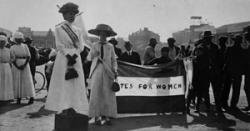
Published date
19 May 1930
The roots of White women's suffrage in South Africa began with the founding of the Women's Christian Temperance Union (WCTU) in 1899. The goal of this organisation was to campaign against the trade in alcohol, which they considered the greatest contributor to moral decay. This organisation was the first to campaign for White women's right to vote in South Africa. They set a Franchise Department six years after the founding of the organisation, because the members had concluded that without political influence, their temperance campaign would be ignored.
As in Britain, the first organised advocates for women's suffrage were middle class reformers, and for them the suffrage was a means to an end with regard to influencing legislation and not connected primarily with the status of women. Women's organisations formed specifically around the issue of suffrage first appeared in the early years of the twentieth century. The first Women's Enfranchisement League (WEL) in South Africa was established in 1902 in Durban. It was established through the work of an English couple, the Ancketills, who had settled in Natal in 1886. Subsequently chapters of this league were established in other South African cities, and this group became known as the Women's Enfranchisement Association of the Union (WEAC).
While WEAC did much to change the perception of women in the period after the South African War, the issue of giving women the vote was overshadowed by a number of issues. Among these were issues that pertained to the Union of South Africa, the status of Blacks and lesser concerns pertaining to their commitment to equality in womanhood and the image they wished to portray. These issues successfully delayed the granting of the vote to White women in South Africa up until 1930 when the Hertzog election platform promised to raise the issue of granting the vote to White women in parliament, on condition that they supported his re-election. After his re-election, Hertzog made good on his word and on the 19 May 1930, White South African women gained the right to vote. This development was tied to denying the vote to Black men in the Cape Province. The efforts by most of the South African suffragettes was based on self interest and not of justice, to the extent that very few of its members expressed solidarity with the plight of Black women and labour.
References
Walker.C, (1990), Women and Gender in Southern Africa to 1945| (Claremont, South Africa: David Philips Publishers ) This day in African History: 19 May (online), available at: https://africanhistory.about.com[Accessed 10 May 2010]| Overcoming the Sisterhood Myth (online), available at: https://digital.lib.msu.edu [Accessed 10 May 2010]